- Home
- Robert K. Massie
Nicholas and Alexandra Page 13
Nicholas and Alexandra Read online
Page 13
The Kaiser was not the only man filling Nicholas’s head with expansionist dreams; many Russians were equally anxious to go adventuring in Asia. The temptations were strong. Russia’s only Pacific port, Vladivostock, was imprisoned in ice three months a year. Southward, the decrepit Chinese Empire stretched like a rotting carcass along the Pacific. In 1895, to Russia’s chagrin, the vigorous, newly Westernized island empire of Japan occupied several Chinese territories which Russia coveted, among them the great warm-water port and fortress of Port Arthur. Six days after Japan had swallowed Port Arthur, Russia intervened, declaring that Japan’s new arrangements “constituted a perpetual menace to the peace of the Far East.” Japan, unwilling to risk a war, was forced to disgorge Port Arthur. Three years later, Russia extracted a ninety-nine-year lease on the port from the helpless Chinese.
The occupation of Port Arthur was heady stuff in St. Petersburg. “Glad news …,” wrote Nicholas. “At last we shall have an ice-free port.” A new spur of the Trans-Siberian was constructed directly across Manchuria, and when the railroad was finished, the Russian workmen and Russian railway guards remained behind. In 1900, during the Boxer Rebellion, Russia “temporarily” occupied Manchuria. Only one further prize remained on the entire North Pacific coast, the peninsula of Korea. Although Japan clearly regarded Korea as essential to her security, a group of Russian adventurers resolved to steal it. Their plan was to establish a private company, the Yalu Timber Company, and begin moving Russian soldiers into Korea disguised as workmen. If they ran into trouble, the Russian government could always disclaim responsibility. If they succeeded, the empire would acquire a new province and they themselves would have vast economic concessions within it. Witte, the Finance Minister, vigorously opposed this risky policy. But Nicholas, impressed by the leader of the adventurers, a former cavalry officer named Bezobrazov, approved the plan, whereupon Witte in 1903 resigned from the government. Predictably, Kaiser William chimed in, “It is evident to every unbiased mind that Korea must and will be Russian.”
The Russian advance into Korea made war with Japan inevitable. The Japanese would have preferred an agreement: Russia to keep Manchuria, leaving Japan a free hand in Korea. But the Mikado’s ministers could not stand by and watch the Russians swarm along the whole coast of Asia, planting the Tsar’s double-headed eagle in every port and promontory facing their islands. In 1901, the greatest of Japanese statesmen, Marquis Ito, came to St. Petersburg to negotiate. He was treated shamefully. Ignored, finding no one to talk to, he put his requests in writing; replies were delayed for days on trifling pretexts. Eventually, he left Russia in despair. Through 1903, the permanent Japanese Minister in St. Petersburg, Kurino, issued urgent warnings and begged in vain for an audience with the Tsar. On February 3, 1904, bowing grimly, Kurino also left Russia.
In Russia, it was taken for granted that if war came, Russia would win easily. It would not be necessary for the Russian army to fire even a single shot, gibed the drawing-room generals. The Russians would annihilate the Japanese “monkeys” simply by throwing their caps at them. Vyacheslav Plehve, the Minister of Interior, wrestling with a growing plague of rebellious outbursts, openly welcomed the idea of “a small victorious war” to distract the people. “Russia has been made by bayonets, not diplomacy,” he declared.
Nicholas, lulled into belief in Russia’s overwhelming superiority, assumed that the decision was his, that war would not come unless Russia began it. Foreign ambassadors and ministers, gathered for the annual gala diplomatic reception on New Year’s Day, heard the Tsar talk grandly of Russia’s military power and beg that there would not be a test of his patience and love of peace. Nevertheless, during the month of January 1904, Nicholas’s indecision kept the Kaiser in a state of constant alarm. He wrote, urging that Russia accept no settlement with Japan, but go to war. He was appalled when Nicholas replied, “I am still in good hopes about a calm and peaceful understanding.” William showed this letter to his Chancellor, von Bülow, and complained bitterly about the Tsar’s unmanly attitude. “Nicholas is doing himself a lot of harm by his flabby way of going on,” said the Kaiser. Such behavior, he added, was “compromising all great sovereigns.”
Japan made a Russian decision unnecessary. On the evening of February 6, 1904, Nicholas returned from the theatre to be handed a telegram from Admiral Alexeiev, Russian Viceroy and Commander-in-Chief in the Far East:
“About midnight, Japanese destroyers made a sudden attack on the squadron anchored in the outer harbor of Port Arthur. The battleships Tsarevich, Retvizan and the cruiser Pallada were torpedoed. The importance of the damage is being ascertained.” Stunned, Nicholas copied the text of the telegram into his diary and added, “This without a declaration of war. May God come to our aid.”
The next morning, huge, patriotic crowds filled the streets of St. Petersburg. Students carrying banners marched to the Winter Palace and stood before it singing hymns. Nicholas went to the window and saluted. Amid the rejoicing, he was depressed. He had flirted with war and tried to bluff his enemies, but the idea of bloodshed revolted him. The people now looked forward to a quick Russian victory; Nicholas knew better. As confidential reports of the damage at Port Arthur continued to arrive, Nicholas set down his “sharp grief for the fleet and for the opinion that people will have of Russia.”
The disaster that followed was far greater than even Nicholas had feared. In scarcely a single generation, Japan had leaped from feudalism to modern industrial and military power. Military instructors from France and naval instructors from England had helped create an efficient army with skilled, imaginative commanders. In the two years since Ito returned, humiliated, from St. Petersburg, Japan’s generals and admirals had perfected their plans for war against Russia. The moment further negotiations seemed futile, they struck.
From the beginning, the match was unequal. Although the Japanese army consisted of 600,000 men and the Russian army numbered almost three million, Japan threw 150,000 men into battle at once on the Asian mainland. There they faced only 80,000 regular Russian soldiers, along with 23,000 garrison troops and 30,000 railway guards. Japanese supply lines stretched back to the homeland over only a few hundred miles of water, and losses could be quickly replaced. The Russians had to haul guns, munitions, food and reinforcements four thousand miles over the single track of the Trans-Siberian Railroad. Even the railroad was not complete; around the mountainous southern end of Lake Baikal, a gap of a hundred miles yawned in the track. In summer, the gap was bridged by lake ferries; in the winter, every soldier and shell had to be moved across the ice in horse-drawn sledges.
The Russian Far Eastern Fleet and the Imperial Japanese Navy were more equal in size; the Russians actually had more battleships and cruisers, the Japanese more destroyers and torpedo boats. But with their first surprise attack, the Japanese seized the initiative and gained command of the sea. Russian ships which survived the war’s first blow were hemmed in by Japanese minefields and harassed at their moorings by further torpedo attacks. When Russia’s most distinguished admiral, Makarov, sortied from the harbor of Port Arthur on April 13, his flagship, the battleship Petropavlovsk, hit a mine and sank with a loss of seven hundred men, Makarov included. “This morning came news of inexpressible sadness …,” Nicholas wrote of the disaster. “All day long I could think of nothing but this terrible blow.… May the will of God be done in all things, but we poor mortals must beg mercy of the Lord.”
With the sea secured, Japanese expeditionary forces were free to land where they chose along the mainland coast. One army came ashore in Korea, overwhelmed five Siberian regiments, crossed the Yalu River and marched north into Manchuria. Another Japanese force landed at the head of the Yellow Sea and laid siege to Port Arthur with monster eleven-inch siege cannons. Through the summer and fall of 1904, the Japanese infantry stormed one fortified height around Port Arthur after another; by January 1905, when Port Arthur finally surrendered, it had cost Japan 57,780 men and Russia 28,200.
F
rom St. Petersburg, Nicholas watched with dismay. His first instinct had been to go to the front and place himself at the head of his beleaguered troops. Once again, his uncles overruled his inclination. To his mother the Tsar wrote: “My conscience is often very troubled by my staying here instead of sharing the dangers and privations of the army. I asked Uncle Alexis yesterday what he thought about it: he thinks my presence with the army in this war is not necessary—still, to stay behind in times like these is very upsetting to me.”
Instead, Nicholas toured military encampments, reviewing troops and passing out images of St. Seraphim to soldiers about to entrain for the Far East. The Empress canceled all social activities and turned the huge ballrooms of the Winter Palace into workrooms where hundreds of women of all classes sat at tables, making clothing and bandages. Every day Alexandra visited these rooms and often sat down herself to sew a dressing or a hospital shirt.
As the grim prospect of a Russian defeat seemed ever more likely, Nicholas, urged on by William, ordered the Russian Baltic Fleet to travel around the world to restore Russian naval supremacy in the Pacific. Admiral Rozhdestvensky, the fleet commander, viewed the project without much hope, but once the Tsar had commanded, he placed himself on his bridge and ordered his ships made ready for sea. In October 1904, Nicholas took the final salute from the deck of the Standart. As the fleet of gray battleships and cruisers slowly left its anchorage and steamed out into the Baltic, he wrote, “Bless its voyage, Lord. Permit that it arrive safe and sound at its destination, that it succeed in its terrible mission for the safety and happiness of Russia.”
Unfortunately, long before he got anywhere near Japan, Admiral Rozhdestvensky almost involved Russia in a war with England. The Admiral had been much impressed by Japan’s surprise torpedo attack on the fleet at Port Arthur. Assuming that such wily tactics would have a sequel, he suspected that Japanese ships flying false colors might slip through neutral European waters to deliver another frightful blow to the Russian navy. No man to be tricked, the Admiral ordered extra lookouts posted from the moment his ships left home port. Steaming at night through the North Sea in this trigger-happy state, Russian captains suddenly found themselves surrounded by a flotilla of small boats. Without asking questions, Russian guns sent shells crashing into the frail hulls of British fishing boats in the waters of Dogger Bank. After the first salvos, the Russians realized their mistake. Such was the Admiral’s fear, however, that, rather than stopping to pick up survivors, he steamed off into the night.
Only one boat had been sunk and two men killed, but Britain was outraged. Nicholas, already irritated by Britain’s diplomatic support of Japan, was in no mood to apologize. “The English are very angry and near the boiling point,” he wrote to Marie. “They are even said to be getting their fleet ready for action. Yesterday I sent a telegram to Uncle Bertie, expressing my regret, but I did not apologize.… I do not think the English will have the cheek to go further than to indulge in threats.”
The Russian Ambassador in London, Count Benckendorff, more accurately assessed the extent of Britain’s anger and quickly recommended that both parties submit the matter to the International Court at The Hague. Nicholas reluctantly agreed, and eventually Russia paid £65,000 in damages.
Leaving this nasty crisis in his wake, Admiral Rozhdestvensky steamed into the Atlantic, bound for the Cape of Good Hope, the Indian Ocean and the Pacific. He stopped and lay at anchor for three months at the French island of Madagascar while Russian diplomatic agents scoured the world’s shipyards seeking to buy extra battleships to reinforce the fleet. The Kaiser ordered German merchant vessels to fuel the Russian squadron. At secluded anchorages in Madagascar and Camranh Bay, Indochina, German seamen transferred hundreds of tons of coal into the bunkers of Admiral Rozhdestvensky’s weatherbeaten ships.
At two o’clock in the afternoon on May 27, 1905, the Russian fleet, led by eight battleships steaming in columns, appeared in the Strait of Tsushima between Japan and Korea. Admiral Togo, the Japanese commander, ranged his ships seven thousand yards across the head of the Russian columns, bringing his guns to bear first on one Russian ship, then another. As this blizzard of Japanese shells ripped though them, Russian warships exploded, capsized or simply stopped and began to drift. Within forty-five minutes it was over. Togo flashed his torpedo boats to attack and finish the cripples. All eight Russian battleships were lost, along with seven of Rozhdestvensky’s twelve cruisers and six of his nine destroyers.
Tsushima, the greatest sea battle since Trafalgar, had a powerful impact on naval thinking everywhere. It confronted Britain, whose whole existence depended on the Royal Navy, with the appalling prospect of losing a war in one afternoon in a general fleet engagement. The Kaiser, who cherished his High Seas Fleet, became equally frightened. As a result, during the four years of the First World War the huge British and German navies collided only once, at Jutland. In the United States, Tsushima convinced President Theodore Roosevelt that no nation could afford to divide its battle fleet as the Russians had done. Roosevelt immediately began pressing ahead with his plan to build a canal through Panama to link the two oceans that washed American shores.
The Tsar was traveling aboard the Imperial train when the news of the disaster reached him. He sent for the Minister of War, General Sakharov, who remained alone with him for a lengthy discussion. Returning to the lounge car where the staff was waiting to learn Nicholas’s reaction, Sakharov declared, “His Majesty showed that he thoroughly recognized the problems ahead of us and he sketched a very sensible plan of action. His composure is admirable.” In his diary that night, Nicholas wrote, “Definite confirmation of the terrible news concerning the almost complete destruction of our squadron.”
Recognizing that Russia no longer had a chance of winning the war, Nicholas sent for Sergius Witte and dispatched him to America to make the best of a peace conference which Roosevelt had offered to mediate. Although the war was ending as he had predicted, Witte accepted the assignment grudgingly. “When a sewer has to be cleaned, they send for Witte,” he grumbled. “But as soon as work of a cleaner and nicer kind appears, plenty of other candidates spring up.”
Crossing the Atlantic on the German liner Wilhelm der Grosse accompanied by a swarm of European journalists, Witte struck a pose as the “representative of the greatest empire on earth, undismayed by the fact that that mighty empire had become temporarily involved in a slight difficulty.” Arriving in Portsmouth, New Hampshire, the scene of the peace conference, to find Americans filled with admiration for the “plucky little Japs,” Witte set out to reverse this image. “I may say that I succeeded in swerving American public opinion over to us,” he noted afterward. “I gradually won the press over to my side.… In this regard, the Japanese plenipotentiary Komura committed a grave blunder.… He rather avoided the press.… I took advantage of my adversary’s tactlessness to stir up the press against him and his cause.… My personal behavior may also partly account for the transformation of American public opinion. I took care to treat all the Americans with whom I came in contact with the utmost simplicity of manner. When traveling, whether on special trains, government motorcars or steamers, I thanked everyone, talked with the engineers and shook hands with them—in a word, I treated everybody, of whatever social position, as an equal. This behavior was a heavy strain on me as all acting is to the unaccustomed, but it surely was worth the trouble.”
Maneuvered by Witte into the role of villains, the Japanese envoys had difficulty in pressing all of their demands. Finally Nicholas—knowing that Japan was financially unable to continue the war—told his Foreign Minister: “Send Witte my order to end the parley tomorrow in any event. I prefer to continue the war, rather than to wait for gracious concessions on the part of Japan.” Komura, who had come as victor, accepted a compromise.
Lunching after the conference with President Theodore Roosevelt at Sagamore Hill in Oyster Bay, Long Island, Witte described the meal as “for a European, almost indigestible. There was
no tablecloth and ice water instead of wine.… Americans have no culinary taste and … they can eat almost anything that comes their way.” He was “struck by … [Roosevelt’s] ignorance of international politics.… I heard the most naïve judgments.” Nor did Roosevelt care much for Witte. “I cannot say that I liked him,” said the President, “for I thought his bragging and bluster not only foolish, but shockingly vulgar when compared with the gentlemanly restraint of the Japanese. Moreover, he struck me as a very selfish man, totally without ideals.”
Returning to Russia, Witte was pleased with himself. “I acquitted myself with complete success,” he wrote, “so that in the end the Emperor Nicholas was morally compelled to reward me in an altogether exceptional manner by bestowing upon me the rank of count. This he did in spite of his and especially Her Majesty’s personal dislike for me, and also in spite of all the base intrigues conducted against me by a host of bureaucrats and courtiers whose vileness was only equalled by their stupidity.”
In fact, Witte had handled the negotiations brilliantly; “no diplomat by profession could have done it,” said Alexander Izvolsky, who was soon to become Russia’s Foreign Minister. Nicholas received the returning hero on his yacht in September 1905. “Witte came to see us,” wrote the Tsar to his mother. “He was very charming and interesting. After a long talk, I told him of his new honor. I am creating him a Count. He went quite stiff with emotion and then tried three times to kiss my hand!”

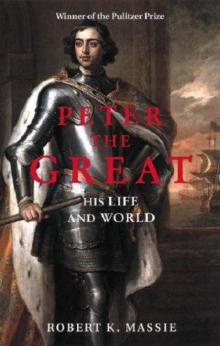 Peter the Great
Peter the Great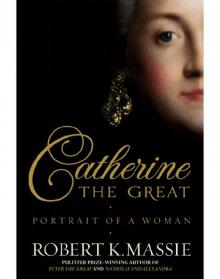 Catherine the Great
Catherine the Great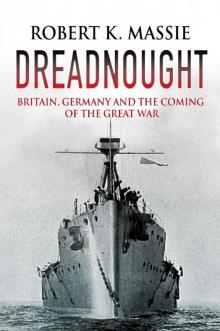 Dreadnought
Dreadnought Nicholas and Alexandra: The Classic Account of the Fall of the Romanov Dynasty
Nicholas and Alexandra: The Classic Account of the Fall of the Romanov Dynasty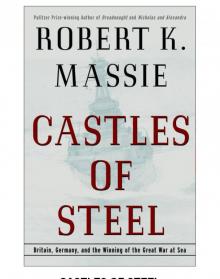 Castles of Steel
Castles of Steel Nicholas and Alexandra: The Tragic, Compelling Story of the Last Tsar and his Family
Nicholas and Alexandra: The Tragic, Compelling Story of the Last Tsar and his Family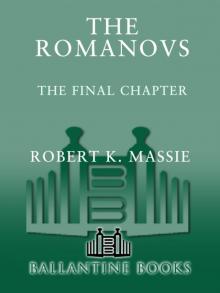 The Romanovs
The Romanovs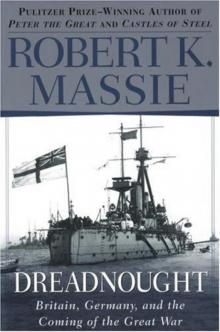 Dreadnought, Britain, Germany and the Coming of the Great War
Dreadnought, Britain, Germany and the Coming of the Great War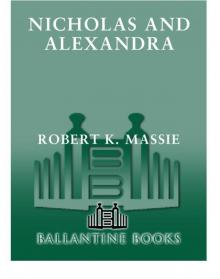 Nicholas and Alexandra
Nicholas and Alexandra